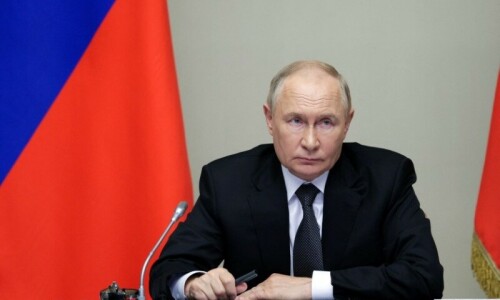The Kremlin accused US President Joe Biden on Monday of escalating the war in Ukraine by allowing Kyiv to use long-range missiles supplied by Washington to strike targets inside Russia.
The comments from Moscow came as Ukraine said a fresh Russian strike on the Black Sea port city of Odesa had killed at least eight people and wounded 18, following a massive weekend attack on the country’s creaking energy infrastructure.
Ukraine has long sought authorisation from Washington to use the powerful Army Tactical Missile System, known by its initials as ATACMS, to hit military installations — and in particular airfields — inside Russia.
Ukraine says it is mainly seeking to use the weapons to prevent Russian aerial bombardments that have levelled entire districts and towns near the front line and decimated energy facilities across the country.
A US official speaking on condition of anonymity confirmed the major US policy shift to AFP on Sunday, specifying that the decision had come in response to Russia’s deployment of thousands of North Korean troops to aid its war effort.
“It’s obvious that the outgoing administration in Washington intends to take steps in order to continue fuelling the fire and provoke a further escalation of tensions,” Kremlin spokesman Dmitry Peskov told reporters in Moscow.
“If such a decision was really formulated and announced to the Kyiv regime, then of course it’s a qualitatively new spiral of tensions and a qualitatively new situation from the point of view of the US’s engagement in the conflict,” Peskov added.
‘Provocation’
Peskov said President Vladimir Putin had expressed Russia’s position clearly in September when the leader said that such a move would put Nato “at war” with Russia.
Putin said in September that if Ukraine were to attack Russia with the long-range missiles then Moscow would “take the appropriate decisions based on the threats”.
Peskov said that Putin’s position is that such strikes would ultimately be carried out not by Ukraine but by the countries that permit such use of missiles.

The Kremlin spokesman said this was because “the targets are set not by Ukrainian military but by specialists from these Western countries. That fundamentally changes the modality of their engagement.”
“That’s the danger and provocative nature of this situation,” he added.
Washington’s decision on the weapons comes weeks after Ukraine warned that North Korea was training and dispatching thousands of its troops to aid the Kremlin war in Ukraine, which is approaching its third anniversary.
Kyiv has warned that Moscow, alongside the North Korean soldiers, has amassed a 50,000-strong force to wrest from Ukraine’s army the parts of the Russian border region of Kursk that it has seized.
Ukraine claimed swathes of Kursk in August during a lightning offensive even as its troops were thinly stretched in the Donetsk region, which has borne the brunt of nearly three years of fighting.
Eight killed in Odesa
The Russian defence ministry, which has been making rapid gains in Donetsk over recent weeks, said it had claimed another village, Novooleksiyivka, in the region where Ukrainian defensive lines have been buckling under Russian pressure.
The advances came one day after Russia’s latest large-scale drone and missile attack targeting Ukrainian energy facilities across the country.
A new strike on the port city of Odesa killed at least eight people and wounded another 18, the regional governor, Oleg Kiper, wrote on social media.
The national grid operator Ukrenergo and Ukraine’s largest private energy company DTEK said that engineers were still repairing damaged facilities in the southern Odesa region following the missile and drone barrage.
DTEK said 400,000 families in several regions had been reconnected but some 321,000 subscribers in the Odesa region were still without power and others in the Black Sea region did not have heating or water supplies.
Yermak said that the fresh attack on Monday showed that “Russian killers no longer even hide their intentions”, as details of the impact of the strike were still emerging.
Ukrenergo also said it had stepped up electricity imports from neighbouring European countries to make up for the shortfall after the Russian broadside.
The weekend attack, which officials said was one of Moscow’s largest since it invaded in early 2022, came just ahead of the 1,000th day of the war which will be marked at the United Nations on Monday and attended by Ukraine’s Foreign Minister Andriy Sybiga.
















































